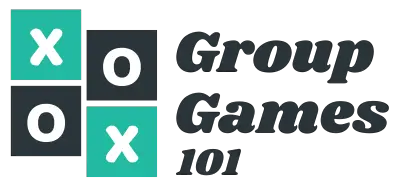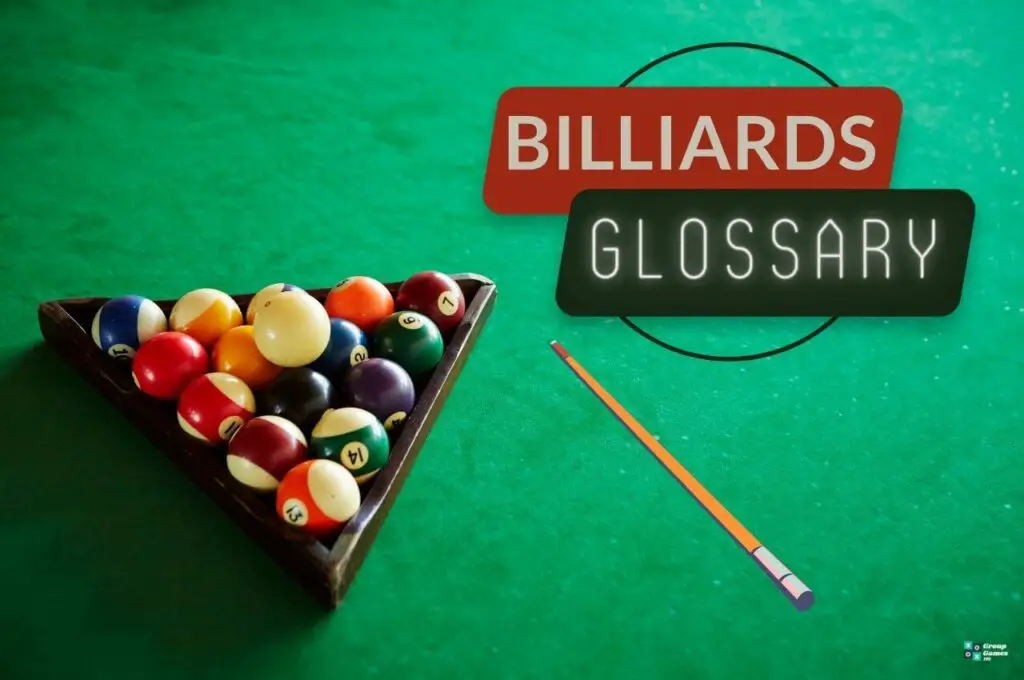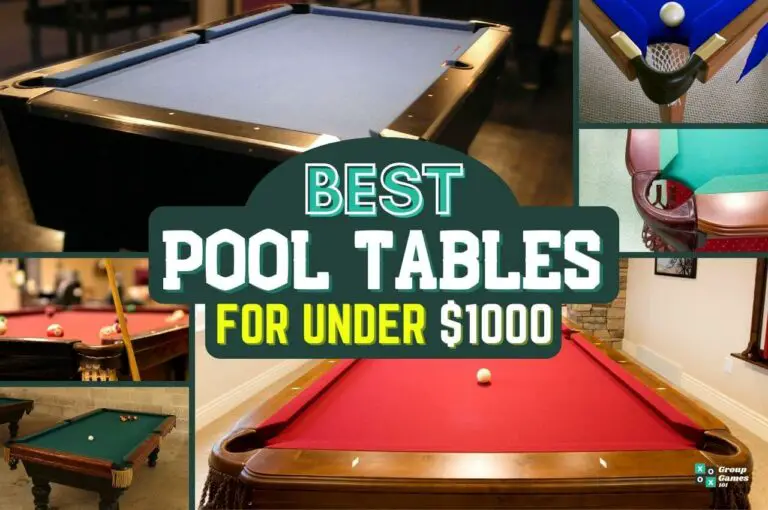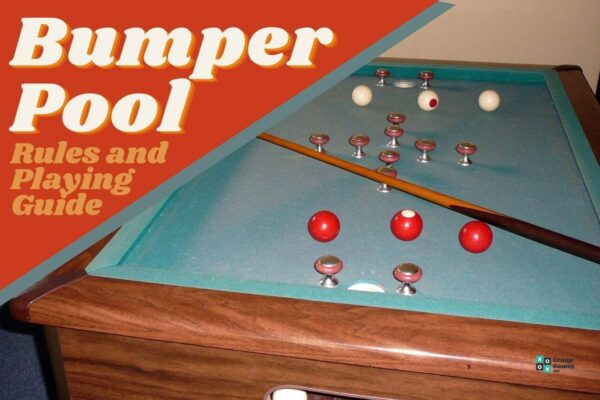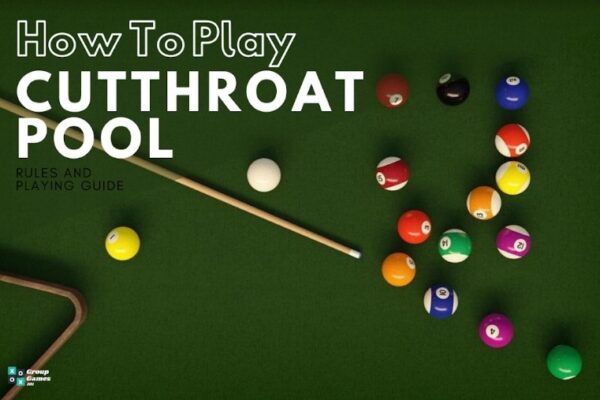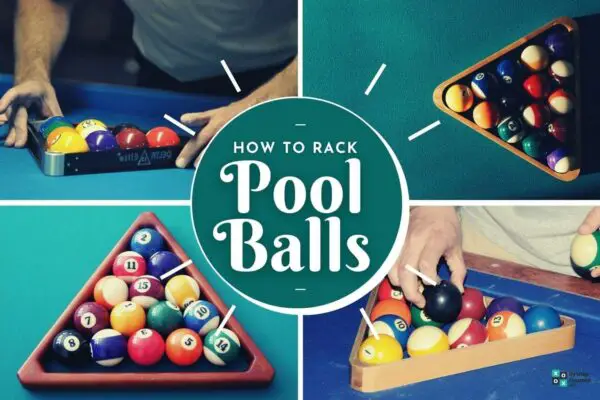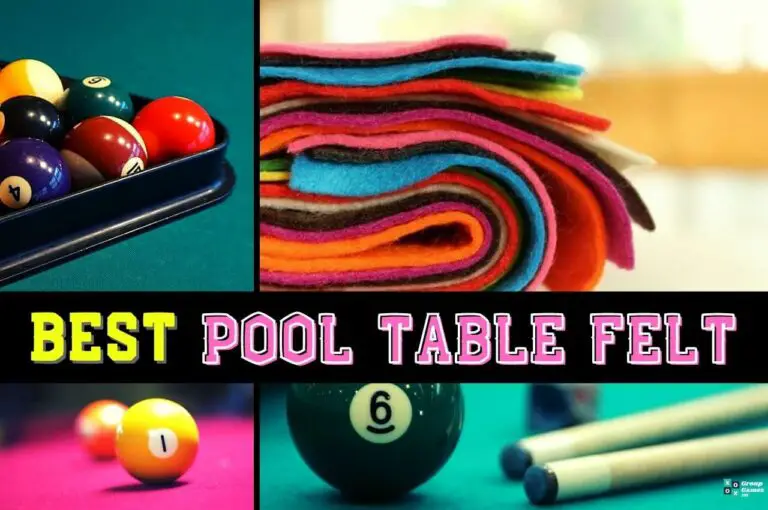In this complete billiards glossary, you’ll learn the meaning of all the important Billiards terms you’ll hear down at your local pool hall.
Whether you’re legitimately learning how to play 9 ball pool or other billiards games and need to check a term you’re not familiar with, or whether you simply need a bluffer’s guide to billiards to help you hold your own in conversation with a die-hard snooker fan, here’s all the key concepts you need to know about.
All Billiards Terms

Angled
In billiards, the term angled refers to a situation where the location of the object ball to the corner pocket stops you from shooting the cue ball directly at it.
Angle Shot
To hit the cue ball in a way that drives it in any direction other than straight ahead is known as an angle shot.
ACS
The American Cue Sports Alliance. This is an organization that oversees the ACS pool league and tournament.
ACUIS
The Association of College Unions International is an organization that -among other things- promotes the prestigious Collegiate Billiards National Championships.
Air Ball
When the object ball is missed completely, that’s known as an ‘air ball’
Alabama 8-Ball
A version of an 8-ball pool in which the 1 and 15 balls have to be pocketed in opposite pre-determined side pockets.
Al Bundy
If your pool buddies call you an Al Bundy, you better believe it’s not a compliment. Named after the main character in the hit 90s sitcom, Married With Children, the name refers to a player who misses often and often leaves easy shots on the table.
Ball in Hand
If you have a ball in hand in billiards, it means you can pick the ball up (literally putting it in your hand) and move it elsewhere on the table.
This is usually done when your opponent commits a foul.
Some rules have restrictions on where you can move the ball, such as behind the line, so it’s always better to ask what the rules are if you’re playing somewhere new.
Bank Shot
A bank shot is a shot in which the object ball is deliberately bounced off at least one of the cushions before it is pocketed.
Bank Pool
A version of pool played entirely with bank shots. Interested in learning this one? Here’s our guide on how to play bank pool.
Billiards
The name ‘billiards’ is a catch-all name for cue sports, including snooker, pool, and other games.
Blocker
An object ball that obstructs a cue ball from hitting a different ball. For example, if you’re lining up a shot but your opponent’s ball is in the way, that’s known as a blocker.
Break
Officially known as the ‘break shot,’ the break is the first shot of the game that breaks up all the balls in the triangle.
If another player tells you it’s ‘your break,’ that means you take the first shot of the game.
Break Cue
A specially designed cue that gives you more power and helps you to make perfect break shots. You can see our guide to the best break cues here.
Carom
A carom is a shot in which the cue ball bounces off one object ball and into another.
Carom Shot
A carom shot is any shot in which the carom causes the second object ball to be pocketed.
For example, if your cue ball hits the 1 ball, bounces into the 2 balls, and the two ball lands in the pocket, that’s your carom shot.
Chop the Pot
In competitive billiards, when two players reach the final of a tournament and agree to split the winnings regardless of the winner, this is known as ‘chopping the pot.’
Clean the Table
Not to be confused with physically cleaning your pool table, to clean the table means to pocket all of the balls left on the table.
Corner pocket
The four pockets in the corner of a table between the ends and the sides.
Curve Shot
When you strike the cue ball downwards on one side, this causes the ball to move in a curved line, hence the name ‘curve shot.’
Cushion
The cushion is the padding around the inside of the table so that your balls can ricochet off.
Cue ball
The white ball that you use to drive into the other balls.
Defensive Shot
A defensive shot is any shot in which you aim to not only pocket the ball, but leave the cue ball and/or other object balls in a position that makes your opponent’s turn that much harder.
Diamonds
Diamonds are the small dots or notches on the table rail which act as reference points when lining up a shot. If you look closely, you’ll notice that the top and bottom rails are divided into four equal parts by the diamonds, while the sides are divided into eight equal parts.
Donut
If you score a donut in billiards, that means you scored zero points. This is so-called because a donut looks like a number zero.
Doubles
Playing billiards in doubles means playing in a team with a partner against another team of two.
Eight-ball
The eight ball is the black ball with the white circle and the number 8 in the middle of it. This is the last ball to be pocketed once a player has pocketed their seven object balls in a standard game of 8-ball pool.
Free Table
A free table is one in which all of the balls remain on the table after the break with neither player having pocketed any. Having a free table means you’re free to aim for either solids or stripes until either you or your opponent pot your first ball.
This is also commonly known as an ‘open table.’
Firewood
If you head to the pool hall with what you think is a great new cue only for a more experienced player to call it ‘firewood,’ it’s time to go back to the store. Firewood is slang for a cue that’s so poorly made or made from such poor materials that it may as well be thrown on the fire!
Foot foul
A particular type of foul in which a player is penalized for not having at least part of a single foot on the floor while taking a shot.
Foul
A foul is any violation of the rules of the game, such as hitting your opponent’s object ball before your own or not hitting any at all. Committing a foul usually means that your opponent will gain a ball in hand.
Garbage Shot
To billiards experts, a garbage shot is what you and I would probably call a ‘fluke.’ In other words, you pocketed a ball but did so more due to blind luck than actual skill.
Some players will call this a ‘slop shot.’
Gutter
The troughs beneath the table which allow the balls to return to the opening where you retrieve them are known as gutters.
Handicap
Handicapping means changing the rules of a game so that players of different skill levels can play a more evenly-matched game.
Hanger
An object ball that sits close to the pocket or hangs over the edge of it is known as a hanger ball.
In Control
If you’re in control in a billiards game, that means you’re the one at the table taking the shots while your opponent sits and waits for their turn.
In Hand
See: Ball in Hand
In the Drink
In the drink means that the ball is in the pocket. This term is usually only used to refer to the cue ball being in the pocket, resulting in a scratch.
Jaws
The walls around the inside of a pocket
Jaw a Ball
To hit a ball so hard that it bounces off the jaws of the pocket, causing you to miss the shot.
Jump Shot
A shot in which the cue ball is bounced off the surface of the table so that it jumps over an object ball.
Kiss
When one ball makes contact with another ball, this is known as a kiss.
Lag Shot
A lag shot is a shot in which you place the ball behind the line with the idea of bouncing off the bottom rail and getting back as close to the line as possible.
Lag shots are normally done by two players before a game to determine who breaks first.
Miscue
When the tip of the cue doesn’t strike the cue ball properly, it’s known as a miscue. This can cause the shot to go askew or result in you not putting enough power behind the ball.
Object Ball
The numbered balls that you drive the cue ball into in order to pocket them.
Pocket a Ball
To pocket a ball means to put the object ball in the table pockets.
You may also hear this referred to as ‘potting’ the ball.
Rack
The term rack is used to describe the triangle-shaped instrument that you use to arrange the balls before breaking.
It can also be used to refer to the process of putting the balls into the rack (as in, ‘racking the balls.’
Rail
The rails of a table are the sides around the top of the table which border the playing surface.
Scratch
Pocketing the cue ball in a game of pool is known as a ‘scratch.’ It results in your opponent getting a ball in hand.
Solids and Stripes
Solids and stripes refer to the two groups of balls on the table. One set of balls are solid colors, the other set is white with a colored stripe around them. The object in most standard pool games is to be the first player to pot all of their designated groups of balls, followed by the eight ball.
Triangle
Another name for a rack.
Still looking to learn more about billiards? Check out our Billiards FAQ or this complete guide to 17 fun billiards games you can learn today.
